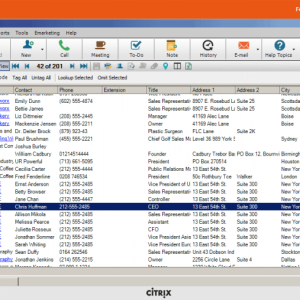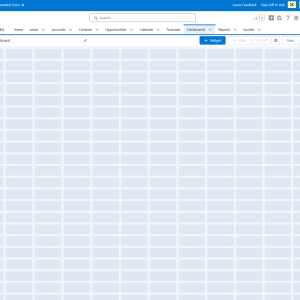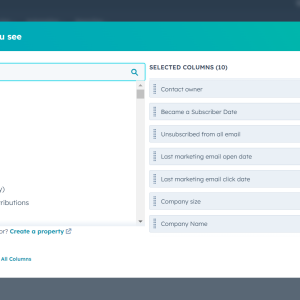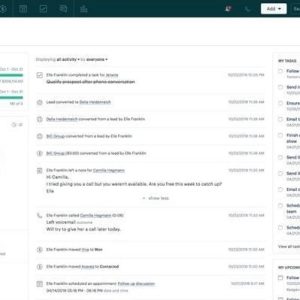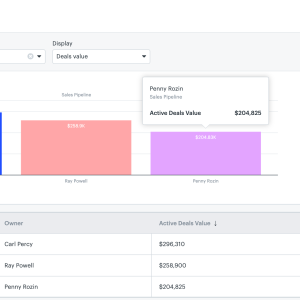In today’s highly competitive business landscape, having an efficient customer relationship management (CRM) system is essential for small businesses to succeed. A good CRM software not only helps businesses manage and organize customer data effectively but also streamlines various sales and marketing processes. With numerous options available in the market, it can be overwhelming for small business owners to choose the best CRM software that meets their specific needs and budget constraints. Therefore, in this article, we will explore and analyze some of the top CRM software solutions specifically designed for small businesses, highlighting their key features and benefits, to help you make an informed decision and take your business to new heights.
Our research found that Zoho CRM is the best CRM for small businesses, offering a lot of features and plenty of low-cost plans that are accessible to teams with a smaller budget. Plus, it offers a free forever plan, which can get you started before you make a financial commitment.
You are viewing: Best CRM Software for Small Business
As a small business, CRM software can make a big difference when it comes to productivity. Whether your team is split between home and the office, or just has a lot of information to keep track of, CRMs are designed to make life easier through organization and automation across the board. Choosing the right provider is important, though, which is why we’ve analyzed and tested some the best options for small businesses to help you find the right fit.
If you’re already a bit overwhelmed at the choices provided, we don’t blame you. The industry is filled with a lot of great options, each of which has a bunch of features, add-ons, and integrations. For a simpler look at the industry as a whole, compare the latest pricing deals here or scroll on for our independent, expert reviews.
The best CRM for small business includes Zoho CRM, Freshsales Suite, and monday.com. Each has their own merits that may (or may not) make them ideal for your own business.
Good CRM software will allow you to ramp up your ability to convert leads, while cutting down on churn at the same time. It can help support teams to deliver solutions to customers, or it can help marketing teams to engage with new and existing customers. All of the above can be crucial for a small business looking to scale up.
Below, we list the best CRM software providers you can choose. Each one has tiered plans that can help a small business scale and grow, so you can find affordable packages that may help you to start small.
- Zoho CRM – Best all-in-one Sales, Marketing, Customer Service
- Freshsales Suite – Best combined Sales and Marketing CRM
- monday.com – Best for customization
- Zoho Bigin – Best entry-level CRM
- HubSpot Free – Best free option
- Zendesk Sell – Best for fast-loading reports
- Pipedrive – Best security options
- Salesforce Essentials – Best for growing businesses
- Less Annoying CRM – Best for simple interface
- Act! – Best for contact information
As you can see, there are plenty of options out there for small businesses, each with their own set of features, price points, and support options that can fit a particular company.
Here’s our closer look at the pros, cons, and unique abilities of the best CRM software vendors available today.
Zoho CRM
Best all-in-one Sales, Marketing, Customer Service CRM
This is Zoho’s main CRM platform, and our top-rated option for small businesses, according to our research. It’s affordable and provides a lot of features covering Sales, Marketing, and Customer Service. During testing, we found this platform to be quick and easy to set up and use, even for beginners. In fact, in our usability research, it scored higher than any other CRM, except for Freshsales Suite, which had a slightly faster setup process.
Zoho CRM is also very customizable, to the extent where you can create new object types, allowing you to store any type of information that’s relevant to your business. All-in-all, this results in a very comprehensive CRM package, offering the best sales management features available.
It is difficult to label where Zoho CRM could even be improved honestly. Sure the price is high, but the additional investment can be justified thanks to the massive set of features and overall functionality of the platform. Simply put, this is the best CRM example for small businesses.
Truly, the only downside to Zoho CRM is that it isn’t exactly suited to the smallest of small businesses, given its larger feature catalog. If you need something a bit more budget friendly for your less demanding needs, Zoho Bigin is a great option for entry-level CRM use, and it’s our fourth top-rated option overall.
Zoho CRM Pricing for Small Businesses
Zoho CRM offers four different pricing plans, in addition to its free plan. The Standard plan costs $14 per user per month, the Professional plan costs $23 per user per month, the Enterprise plan costs $40 per user per month, and the Ultimate plan costs $52 per user per month. This is considerably cheaper than industry-leader Salesforce, although the features aren’t as advanced.
Our research shows that the Professional plan is the best option for small businesses. The Professional plan comes in at $23 per user per month. Compared to the less expensive plans, it adds a wide range of functionality, without too much of a price jump. From sales features like macros and SalesSignals to the added automation functionality, this plan gives small businesses the power to really dig into their strategy without costing a fortune.
Another true benefit of this plan is that it unlocks a wide range of social media features which can greatly improve your overall experience. It includes data on Twitter and Facebook, as well as automated lead generation through your favorite platforms.
Freshsales Suite
Best combined Sales and Marketing CRM
Freshsales Suite is Freshwork’s all-in-one sales and marketing product that is specifically aimed at small businesses. This platform has been found to have one of the best offerings, because it provides a great level of functionality within a straightforward, easy to use package. It was the highest ranked CRM for ease of use, making it a great CRM for startups, although it suffers substantially when it comes to features, offering virtually no customer service functionality, unlike our top choice Zoho CRM.
On top of all that, Freshsales Suite provides good customer service options across all its plans and comprehensive reporting tools. It even provides a lead scoring algorithm which automatically scores your leads based on data from previous sales and information you can input yourself. This makes it easy to understand which leads you’ll have the best chance of converting into customers.
Freshsales Suite Pricing for Small Businesses
Freshsales Suite comes in three different pricing plans, as well as a free plan. The Growth plan costs $15 per user per month, the Pro plan costs $39 per user per month, and the Enterprise plan costs $69 per user per month.
According to our research, the Pro plan is the best option for small businesses. The Growth plan from Freshsales Suite costs $39 per user per month.
At a reasonable price point, this plan still offers a whole lot of functionality, including workflows, custom reports, and a visual sales pipeline, so you can understand how your customers interact with your business. The next most expensive plan comes in at a whopping $69 per user per month, which is why this option is the best bet for small businesses.
monday.com
Best for customization
As a complete and fully functional sales CRM, monday.com provides some unmatched customizability when it comes to CRM. While that may sound intimidating to first-time users, monday.com combines this platform flexibility with some seriously intuitive design, so you won’t be bogged down by complicated customizations. During our review of monday.com CRM, we found it to be an easy-to-use platform with impressive flexibility.
For one, you can edit almost anything – allowing you to fully tailor the platform to your business. There are also several dedicated CRM features available with monday.com, like the ability to create web forms, create invoices, and send emails.
Even better, monday.com provides this at a very competitive price – making it a genuinely attractive option for businesses. Starting at $10 per user, per month, it more affordable than Zoho CRM (14 per user, per month), Freshsales Suite ($15 per user, per month), and most other options on this list, with only Zoho Bigin ($7 per user, per month) offering a lower starting price.
The only real downside to monday.com is help and support. Those having issues with the platform are left to rely on email, forums, and help articles, which isn’t always ideal, but hopefully the general ease of use should suffice.
monday.com Pricing for Small Businesses
monday.com pricing offers four different pricing plans, as well as a free plan. The Basic plan costs $10 per user per month, the Standard plan costs $14 per user per month, the Pro plan costs $24 per user per month, and the Enterprise plan does not provide publicly available pricing.
See more : Zoho Pricing – How Much Does Zoho CRM Cost?
For small businesses, we recommend investing in the Pro plan for your CRM needs. The Pro plan from monday.com comes in at $24 per user per month.
Given that monday.com is one of the more affordable options on this list, the higher-tier plans make more sense, as they won’t cut into your budget and still offer a lot. You’ll get up to 25,000 automations and integrations, along with a dashboard that can combine multiple boards. Plus, with time tracking enabled, you can really turn monday.com into a full-on CRM with this plan.
Zoho Bigin
Best entry-level CRM
This is Zoho’s dedicated small-business CRM platform. Zoho have aimed this product at users taking their first steps from spreadsheet to CRM. As such, it is very-low cost, but still provides a good level of functionality. It was also found to be one of the more customizable platforms, allowing users to tailor it to their specific needs. All-in-all, this results in a very convincing small business CRM package.
Where Bigin can be improved is with aspects of usability. Most notably, the onboarding process had one of the more complicated data imports on the list. It also lacks any form of “live” help and support, unlike the full-on Zoho CRM, leaving users to rely on email, forums, and help articles when they have a problem.
Zoho Bigin Pricing for Small Businesses
Zoho Bigin pricing is pretty basic. It offers two pricing plans, in addition to its free plan. The Express plan costs $7 per user per month and the Premier plan costs $12 per user per month.
For your small business, we recommend you opt for the paid plan, which is dubbed Express. The Express plan from Zoho Bigin costs only $7 per user per month. As one of the more affordable options on the list, Zoho Bigin is definitely an option for those just graduating from spreadsheets. It offers basic functionality that’ll get you by.
You can test Bigin out with the free plan, but for business purposes, we highly recommend opting for the paid plan, as the free plan really lacks the functionality necessary to conduct business in a meaningful way. For example, you can only use the email features in the paid plan, which is vital to the success of any growing business.
HubSpot Free
Best free option
This is HubSpot’s free platform, an all-in-one product providing sales, marketing, and customer service functionality. Rather than a dedicated small business platform, it acts as the “starting tier” of their paid products which specialize in one those aforementioned areas. HubSpot is not the only option on the list with a free plan, with Zoho CRM offering one as well, but you can’t beat the HubSpot free plan when it comes to functionality for sales, marketing, and customer service.
In fact, HubSpot actually provides a pretty comprehensive package that competes with the paid products listed here in terms of functionality. It scored well in usability due to its thorough onboarding process and tidy interface.
Key points of improvement for HubSpot Free would be the limited customization it provides users, which is to be expected with a free plan. It also has basically no customer support options aside from forums and help articles. Understandably, both of these are locked behind a paywall – encouraging users to pay for very expensive premium platforms which are arguably beyond the price range of a small business.
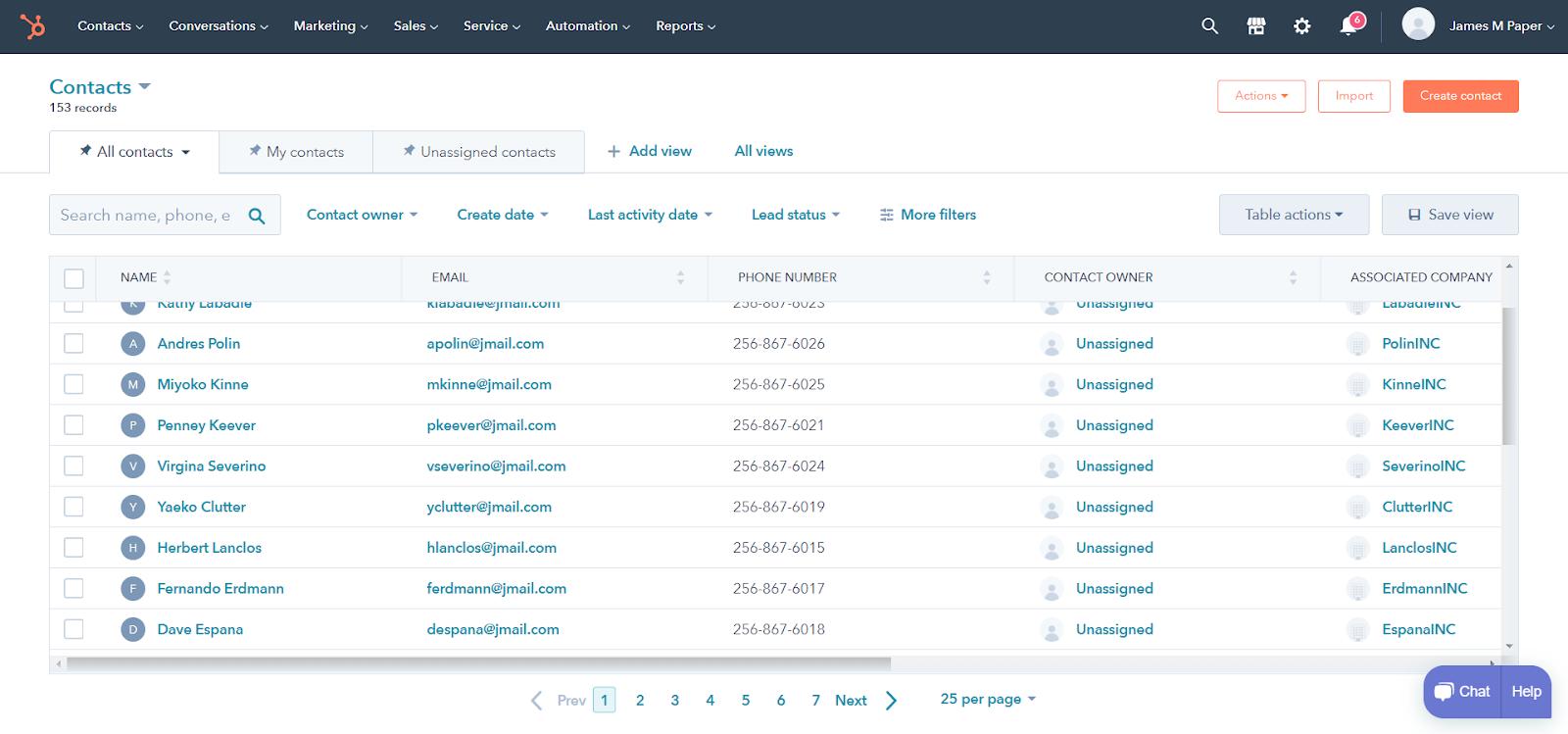
HubSpot Pricing for Small Businesses
HubSpot offers a whole bunch of pricing options for sales, marketing, and customer support. The Starter plan costs $23 per user per month, the Professional plan costs $90 per use per month, and the Enterprise plan costs $120 per user per month.
All that is pretty expensive, which is why we only recommend the Free plan for small businesses. As you can imagine, the Free plan from HubSpot costs nothing forever, so you can start organizing your business without cutting into your budget at all.
For a free plan, it’s surprising robust, allowing for contact and ad management, live support chat, email scheduling, and ticketing. The only problem is that scalability means you’ll have to pay a lot to upgrade, so make sure this is all you need in the long term.
Learn more in our HubSpot vs Zoho CRM comparison guide
Zendesk Sell
Best for fast-loading reports
Zendesk Sell is the sales-focused CRM by Zendesk, one of our top-rated providers when it comes to CRM. Our research shows that this option has a few strengths, including its notable ease of use, even for beginners, its customizability, which is key for growing businesses, and its prices, which are reasonably competitive in the field.
Still, it has some weak spots too, with help and support leading the pack. With virtual no options for contacting the team, including no email, phone, or live chat, you’re left to check out the knowledge base and community forum for all your issues. The security is also pretty weak, lacking features that Zoho CRM has, like user permissions and multi-factor authentication. To be clear, though, Zendesk offers lots of integrations so you can fix that for a price.
Overall, we can really only recommend Zendesk Sell to actual sales teams that need a customizable option at a lower price. If you work in marketing or customer service, we highly recommend you stay away.
Zendesk Sell Pricing for Small Businesses
Zendesk Sell offers four different pricing plans for a wide range of business needs. The Team plan costs $19 per user per month, the Growth plan costs $49 per user per month, the Professional plan costs $99 per user per month, and the Enterprise plan costs $150 per user per month.
The best Zendesk Sell plan for small businesses is the Team plan, which costs $19 per user per month and provides a wide range of sales features to help your business. From extensive sales reports to live chat and forum support, you’ll have a good idea of how your team is doing while saving some time. This plan also comes with 2GB of storage per users, which isn’t much, but should be more than enough for small businesses.
Pipedrive
Best for security options
Pipedrive is a dedicated small business CRM platform aimed primarily at Sales teams as a solution for tracking business deals. Pipedrive isn’t a particularly competitive platform compared to others on this list. It provides an average level of functionality whilst being one of the more expensive options.
While it is a bit expensive, you could classify Pipedrive as the premium option where you get both a competitive level of functionality and a good user-experience. Yes, the starting price is competitive at $14.90 per user, per month, which is comparable to Freshsales Suite ($15 per user, per month) but the high tier plans get as high as $69 per user, per month, and for this level of functionality, that’s a bit much.
With Pipedrive, tasks can be completed quite quickly within the platform, and its chatbot and web form functionality are the most straight-forward to use, especially when compared to Freshsales Suite and HubSpot.
Pipedrive Pricing for Small Business
Pipedrive pricing comes in four different plans. The Essentials plan costs $14.90 per user per month, the Advanced plan costs $24.90 per user per month, the Professional plan costs $49.90 per user per month, and the Enterprise plan costs $99 per user per month.
For small businesses, we recommend the Advanced plan. The Advanced plan costs $24.90 per user per month and offers core CRM functionality, along with API access, contacts maps, and a basic meeting scheduler. You’ll be allowed up to 10,000 deals, which is more than triple the amount in the less expensive plan, so you don’t have to worry about a harder limit. Plus, this plan unlocks a lot more automation and communication tools, which are integral to the effectiveness of a CRM.
Salesforce Essentials
Best for growing businesses
See more : Pipedrive vs Zoho CRM – Price and Features Comparison 2023
This is Salesforce’s starting tier for its Sales and Customer Service products. As such, it provides all-in-one Sales and Customer Service functionality but lacks Marketing features. Salesforce markets the Essentials plan as its product for small businesses but — like HubSpot Free — this works more like a stripped back version of their enterprise products (although HubSpot comes with marketing features). With that being said, in the context of small business CRM, it provides a competitive level of functionality.
Where the Salesforce Essentials plan is lacking is mainly on usability and price. Whilst, it did well overall in the usability testing, it would’ve scored significantly better had it not been for a poor user onboarding experience. It’s also more expensive than other platforms, which are just as good for functionality and usability.
Salesforce Pricing for Small Business
Much like HubSpot, Salesforce offers a wide range of pricing options depending on what you’re looking for. The Essential plan costs $25 per user per month, the Professional plan costs $75 per user per month, the Enterprise plan costs $150 per user per month, and the Unlimited plan costs $300 per user per month.
These advanced plans can get pretty pricey and elaborate, which is why we only recommend the Salesforce Essentials for small businesses. The Essentials plan costs $25 per user per month, putting it right at the top end of the spectrum for small business pricing. You’ll get access to sales and service functionality, but unfortunately, all marketing features are only available in an entirely different product.
Still, the Essentials plan gives you the ability to track your customers, view analytics, and integrate with other tools, making it a viable option for small businesses that may need to scale up down the line.
Check out our Salesforce pricing page for more information on other products
Less Annoying CRM
Best for simple interface
If you’re looking for basic, Less Annoying CRM is as basic as it comes for this kind of software. No bells, no whistles, no complicated interfaces. Less Annoying CRM is aimed at providing a simple, uncomplex software that will help your small business run effectively.
To be clear though, Less Annoying CRM is definitely missing some key features. There’s no lead scoring, no API access, and limited support, so you’ll want to be sure this bare-bones option still fits your particular needs. If you love low prices and easy to use platforms though, this is definitely an option, although there are other CRM providers at $15 per user, per month that could offer more, like Zoho CRM’s Standard plan, for example.
Less Annoying CRM Pricing for Small Business
The price for Less Annoying CRM is also pretty basic, as there’s only one plan to choose from. No need to do your research, you’ll get the same across the board for a mere $15 per user per month and you can test out the platform before you make that commitment with a 30-day free trial, which is pretty generous compared to the average two-week offering from other competitors.

Act!
Best for contact information
Obviously, a lesser known CRM compared to some options on this list, Act! CRM is a solid option for small businesses, depending on what you need it for. The platform is primarily aimed at marketing businesses, as it offers some good email options that can get you started on your next campaign. It is pretty average overall though, as it doesn’t offer any social, paid, or content marketing functionality, but for email, it gets the job done.
The support is pretty good too, offering email, phone, and live chat responses, although you won’t get them 24/7 unfortunately which you can find with options like Pipedrive. If you’re a customer service business looking for a CRM, we highly recommend looking elsewhere, as Act! doesn’t have much to take care of your customers in that way.
Act! Pricing for Small Businesses
Act! used to offer different pricing plans with different feature sets, but now you have the choice between a cloud-based system and an on-premises system. We’d recommend going with the cloud-based, but if you think you can handle the responsibility of an on-premises system, go for it!
The Act! Premium Cloud pricing plan will cost you $30 per user, per month and allows for easy automatic updates, disaster recovery, and up to 6GB of cloud storage. Conversely, the Act! Premium Desktop plan costs $37.50 per user, per month, allowing for networked and offline access and complete control of updates. You will have to manage your own security and upkeep of the offline system, but hey, if you want to go that route, Act! offers it.
The Benefits of CRM Software for Small Businesses
If you’re looking for the best CRM software for small business, it’s safe to assume that you’d like to know how CRM actually benefits your business. Suffice it to say, these providers aim to generally improve your sales, service, or marketing efforts, and they do so in a wide range of different ways.
Improve productivity
Whether you need a CRM platform for sales, service, marketing, or all three, the right provider will be able to improve productivity across the board through organization, automation, and collaboration.
It could be by increasing sales through more qualified leads and streamlining your sales funnel. It could be by saving service contacts and speeding up customer requests. It could even be by automating your marketing efforts, so you’re gaining and retaining customers more often.
Plus, every growing organization will reach a tipping point where their customer data will grow too difficult to manage. At this point, relying on shared spreadsheets, sticky notes, or simply keeping everything in your head will likely lead to a loss of information which can be detrimental.
Simply put, CRM software is designed to improve productivity across your business by making life a bit easier when it comes to the smaller details, so you can focus on the big picture. Plus, with the average CRM providing $8.71 return on investment for every dollar, it’s safe to say it’s a no-brainer.

Robust analytics
When it comes to business, it’s hard to know what’s working and what isn’t. However, in addition to providing all these streamlining features, CRM software typically comes with reporting and analytical tools that can help you understand exactly how to improve your business.
The numbers back up the importance of analytics as well. In fact, one study found that businesses that utilize some form of reporting tools see an 8% increase in revenue and a 10% reduction in costs. In so many words, you need to start analyzing your data and CRM software is a great place to start.
Streamlined communications
Keeping in touch with your team and your customers is arguably one of the more important aspects of running a business, and CRM software provides it in spades. Whether it be in-platform messaging or simply an effective email marketing tool, CRM can make communication easier on everyone involved.
Considering well-connected teams are 20-25% more productive, according to one study, it’s safe to assume that getting on the same page with your team via CRM software can do wonders for your bottom line. And if you aren’t trying to improve that, then what are you doing in business?
Still not convinced? Discover more benefits of using CRM in this guide.
How We Rate CRM Software
At Duanetoops, we take the ranking the best CRM for small business very seriously. We aren’t just picking numbers out of thin air – we’re thoroughly and tirelessly researching and evaluating software based on a wide range of metrics, to make sure you have all the information you need to make the right choice for your business the first time.
By providing our own independent research, we hope that users will be able to make smart, informed decisions about what kind of CRM software provider will work best for their particular needs.
For CRM software specifically, our research looks at five different factors, including:
Usability
- This area looked at how well each platform responds to typical user-behavior.
- This assessment was carried out through hands-on testing where a participant was required to set up each CRM platform and then carry out tasks.
- Each task was grouped into timed stages. Platforms were rewarded for enabling the participant to complete each task efficiently and without significant roadblocks.
Customization
- This area looked at the extent to which each platform can be customized to accommodate their user’s specific needs.
- Every organization will have existing processes. A CRM platform should be able to compliment these by enabling their users to reflect them within the system.
- Customization can also enable users to gain more from a platform by allowing them to create workarounds for features which are not available.
- Data was obtained through hands-on testing.
Functionality
- This area looked at the number of features provided by each CRM platform.
- The features have been divided into 9 categories. Platforms are rewarded for the number of features they provide to their users.
- Data was obtained from hands-on testing and each vendor’s website.
Pricing
- This area looked at the cost of each CRM platform.
- Platforms were scored based on their cost in comparison to the general market rate of small business CRM software.
- Data was obtained from each of the vendor’s websites.
- Check out our CRM Pricing Guide for more information
Help and support
- This area looked at the customer support options available in each platform.
- Platforms were scored based on the number of support options they provided. Additional reward was given to platforms which provide a ‘live’ form of customer support such as live chat or a phone line.
- Data was obtained from each of the vendor’s websites.
That’s a wrap on “ Best CRM Software for Small Business ” We hope you’ve found a trove of useful insights and fresh perspectives. Your opinions and ideas matter to us—join the conversation below and share your take! Hungry for more tech insights? Dive into our diverse collection of articles where innovation meets practicality. Discover More CRM Softwares.
Stay in the loop with the latest in AI and tech – your journey into the digital future continues at duanetoops.com.
#CRM #Software #Small #Business
Source: https://duanetoops.com
Category: CRM
